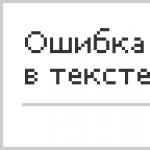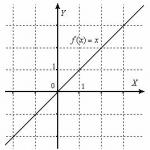Project “Oh, yes Maslenitsa!” “Our Maslenitsa, you are wide, you came to our kindergarten and brought spring!” - presentation. Presentation for children. In Russian life, Maslenitsa is one of the brightest spring holidays. Since recent times, the week before Lent has been called
Anastasia Sergeevna
Presentation "Maslenitsa" for seniors preschool age
Maslenitsa(1 slide)
What a holiday Maslenitsa? (2 slide)
Story Maslenitsa(3 slide)
Maslenitsa- an ancient Slavic holiday that we inherited from pagan culture. This happy farewell winters, illuminated by the joyful anticipation of imminent warmth, the spring renewal of nature. It got its name from the fact that during this period of time, the last week before Lent, the consumption of butter is allowed. oils, dairy products and fish.
start date Maslenitsa varies each year depending on when Lent begins.
The main traditional attributes of folk celebrations Maslenitsa in Russia - pancakes and festivities.
(4 slide)
Maslenitsa happens in late February - early March.
It is celebrated for a week.
(5 slide)
Every day Maslenitsa has its own
name and rituals.
(6 slide)
Maslenitsa starts on Monday, which is called the meeting. On this day they meet Maslenitsa, dress up a stuffed doll, build snowy mountains, booths. Those who are richer begin to bake pancakes. The first pancake is given to the poor to commemorate the dead.
(7 slide)
Morning... Monday!
Coming "Meeting"!
Bright sleds slide down the hills!
All day fun!
Evening is coming...
Having skated to their heart's content, they eat all the pancakes!
(8 slide)
Tuesday - flirting. In the morning, young people were invited to ride from the mountains and eat pancakes. Relatives were called and acquaintances: “We have the mountains ready and the pancakes baked - please be kind”.
(9 slide)
"Flirting" careless
Tuesday is a joy.
Everyone came out to walk and frolic as one!
Games and fun, and for them reward:
Rich and rosy Maslenitsa pancake!
(10 slide)
Wednesday is delicious. On this day my son-in-law came “to my mother-in-law for pancakes”. In addition to the son-in-law, the mother-in-law invited other guests.
(11 slide)
Here the environment is suitable - "gourmet" called!
Every housewife casts a spell at the stove!
Kulebyaki, cheesecakes - they succeed in everything!
Pies and pancakes - everything is on the table!
(12 slide)
Thursday is a big revelry, the most fun day. They carry a stuffed animal on a wheel, ride around, sing songs, and start caroling.
(13 slide)
People! Nowadays “Go for a walk!
Troika, take it for a ride!
We need to drive away the winter
And call for spring!
Day four we will be together
Sing about Maslenitsa songs!
(14 slide)
Friday is mother-in-law's evening. Sons-in-law invited their mothers-in-law to visit and treated them to pancakes.
(15 slide)
Friday has come - "Evening with mother-in-law".
Mother-in-law comes to her son-in-law for pancakes!
And for pancakes, caviar, salmon and sour cream,
Help yourself, mother-in-law, you’re like a mother to me!
(16 slide)
Saturday - sister-in-law's get-togethers. On this day, young daughters-in-law invited their sisters-in-law to visit them. The newlywed daughter-in-law had to give gifts to her sisters-in-law.
(17 slide)
Saturday is approaching - "Sisters-in-law's treat".
All the relatives meet and dance in a circle.
The holiday continues, general fun.
A nice farewell to Zimushka!
(18 slide)
Last day Maslenitsa- Forgiveness Sunday or farewell. The party ends, fires are lit on the ice slides to melt the ice and destroy the cold. They ask for forgiveness and do merciful deeds.
(19 slide)
Bright Sunday is coming quickly.
All ease the soul "forgiveness day".
The straw effigy is burned,
Dressed in a sheepskin coat, felt boots, a belt….
(20 slide)
Goodbye, goodbye, goodbye
Our Maslenitsa!
You didn’t come on Wednesday and you didn’t come on Friday.
You came on Sunday
Fun all week!
Fun all week!
You came with goodness
With cheese, butter and egg!
With pancakes, with pies,
Yes with pancakes!
(21 slides)
Many people think that on the last day Maslenitsa week
burning an effigy Maslenitsa, but no, not Maslenitsa is burned,
and farewell to Winter!
In the old days, men and women took from their yard
a bunch of straw, put them in one pile, from which everyone then
the village made a doll, dressed it up "womanish"- in bright skirts,
they tied sweaters and a smart scarf and carried them all over the city
in a sleigh, greeting and honoring the Madam - Maslenitsa. And then
burned at the stake, throwing pancakes into the fire, as a funeral
food The children were told that all the nourishing food was burned in the fire,
thereby explaining to them why during Lent they only eat
lean food.
(22 slide)
Sayings about Maslenitsa
Not living, but Maslenitsa.
Not everything is great for the cat Maslenitsa, there will be Great Lent.
Maslenitsa lasts for seven days.
Shrove Tuesday, I took the money.
This Maslenitsa is coming, damn it, it carries honey.
No pancakes Maslenitsa.
Pancakes, pancakes, pancakes, like the wheels of Spring.
Publications on the topic:
Summary of OOD for children of senior preschool age within the framework of the “Broad Maslenitsa” project Municipal preschool educational institution"Kindergarten No. 274 of the Krasnoarmeysky district of Volgograd" "Broad Maslenitsa"
Summary of direct educational activities for children of senior preschool age “Hello, Maslenitsa” Abstract directly educational activities“Hello, Maslenitsa!” for children of senior preschool age Completed:.
Summary of direct educational activities for senior preschool age “Maslenitsa” Topic: Maslenitsa. Integration educational areas: “Artistic-aesthetic”, “Cognitive-speech”, “Communicative-personal”,.
Presentation “Journey into Space” for senior preschool age The presentation “Journey into Space” was developed for senior preschool age on the cognitive development of children “Me and the world around me.”
Scenario of the Maslenitsa holiday for children of senior preschool age Prepared by: ILALOVA AIGUL AZATOVNA, music director of MBDOU.

Oh, yes, Maslenitsa, wide, stay for a week, And you, people, celebrate Maslenitsa! Yes, invite you to Maslenitsa!





By the first day of Maslenitsa, mountains, hanging swings, booths for buffoons,
tables with sweets. Not to ride from the mountains and on the swings, not to make fun of the buffoons meant in the old days - to live in bitter misfortune.





Maslenitsa in proverbs and sayings
- Maslenitsa lasts for seven days.
- It was Maslenitsa at the yard, but I didn’t go into the hut.
- Maslyona is afraid of bitter radishes and steamed turnips.
- A pancake is not a wedge, it won’t split your stomach.
- It's not Maslenitsa without pancakes. It's not a birthday party without a cake.
- Damn it's not bad for the belly.
- Ride the mountains, lie in pancakes.

Thursday – “Revelry” From Thursday, not without reason called « wide », Maslenitsa revelry unfolded in all its breadth. The whole world, as participants or active, interested spectators, came out to fist fights, the construction and capture of a snowy city, horse racing, and riding in the streets.
Friday - “Mother-in-law's party” If on Wednesday the sons-in-law visited their mothers-in-law, then on Friday the sons-in-law had « mother-in-law's evenings » - invited for pancakes.

Saturday - « Sister-in-law's get-togethers ». On the sixth day of Maslenitsa week, custom required the daughter-in-law to invite her sister-in-law, her husband’s sister, to visit, feed and give her gifts. As a rule, on this day the daughter-in-law received all her husband’s relatives and had a festive dinner.

Sunday - « forgiven day »
We organized a farewell to Maslenitsa. In the morning, the children collected wood for the fire to burn Maslenitsa. On the last day of Maslenitsa, everyone asked each other for forgiveness, the newlyweds visited their relatives, gave gifts to their father-in-law, matchmakers and boyfriends for wedding gifts.
Many people think that on the last day of Maslenitsa week they burn an effigy of Maslenitsa, but no, they don’t burn Maslenitsa, but say goodbye to Winter!
Goodbye, honest Maslenitsa! If you're alive, I'll see you. Wait at least a year, but know, know, that Maslenitsa will come again...
Description of the presentation by individual slides:
1 slide
Slide description:
MASLENITSA Goal: To study and revive interest and respect for Russian culture, ritual national holidays, traditions, customs. Teacher additional education highest category MBOU DOD RCVR Krasny Sulin Ryazhskikh Iraida Borisovna
2 slide

Slide description:
They kept in their peaceful life the Habits of dear old times: At Maslenitsa they had Russian pancakes... A.S. Pushkin
3 slide

Slide description:
Maslenitsa is the most joyful and bright holiday that came to us from pagan Rus', a real farewell to Winter. The name of the holiday “Maslenitsa” comes from the fact that on this day they ate a lot of oily foods.
4 slide

Slide description:
The history of Maslenitsa dates back to the era of pagan tribes in Rus'. Among the ancient Slavs, this holiday marked the farewell of winter, the welcoming of spring and the beginning field work. During Maslenitsa, our ancestors made sacrifices to the Gods, performed rituals, and held feasts. After the adoption of Christianity, the holiday was preserved in Rus'. All the rituals that were performed in pagan Rus' on Maslenitsa absolutely invariably transferred to Orthodox Rus'. The rituals dedicated to the Sun God have become the most popular for the holiday: rolling a set of wheels on fire through the streets, burning bonfires, cooking pancakes - all these are symbols of the supreme god Yarilo.
5 slide

Slide description:
Maslenitsa is celebrated in the last week before Lent. Each day of Maslenitsa week has its own name and requires certain rituals. The first three days are Narrow Maslenitsa, the subsequent days are Broad Maslenitsa.
6 slide

Slide description:
But the most important thing is the pancakes! Damn is a symbol of the sun. Just as round and hot. They are served on the table piping hot. With butter, sour cream, caviar, mushrooms, sturgeon or stellate sturgeon - choose to suit every taste. And, having eaten your fill, go for a walk and have fun!
7 slide

Slide description:
Monday - Meeting By the first day of Maslenitsa, public slides, swings, and tables with sweet dishes were built. Pancakes began to be baked in houses. The first pancake was given to the poor to commemorate the dead. On this day, a scarecrow of Maslenitsa was made from straw. In the old days, children went outside in the morning to build snow mountains. The children started shouting: “Maslenitsa has arrived, Maslenitsa has arrived!” and held fist fights in honor of the arrival of their dear guest.
8 slide

Slide description:
Tuesday - Flirting This day was dedicated to the newlyweds. They rode down the mountain and invited their relatives and friends: “We have the mountains ready and the pancakes baked - please welcome.” These days, young people were looking for brides, and girls were secretly looking at their betrothed. After fun games boys and girls gathered at a common table. In the old days, on Maslenitsa, people not only walked on this day, but also told fortunes.
Slide 9

Slide description:
Wednesday - Lakomka On the third day, sumptuous tables were laid in all houses. Numerous stalls opened right on the street, selling hot pancakes, roasted nuts, honey gingerbread, sbitni (drinks made from water, honey and spices). On this day, the son-in-law (daughter’s husband) came to his “mother-in-law for pancakes.” Oh, you Gourmet Wednesday! Maclyan frying pan! It's been a custom since ancient times, We're going to my mother-in-law's for pancakes!
10 slide

Slide description:
Thursday - Razgulyay On this day it was customary to organize fist fights, capture specially built snow forts, roller coaster rides, and fun carnivals. According to an ancient custom, on this day in Rus' they baked larks, doves, and swallows from butter dough - the harbingers of Spring.
11 slide

Slide description:
12 slide

Slide description:
Mother-in-law's suppers A good mother-in-law, we know, does not have a skinny son-in-law! They feed him pies and sour cream with pancakes, When the son-in-law comes to visit, The bones jingle in him, and when he goes home - He won’t pass through the doorway! He will eat a basket of pies and three boxes of pancakes! Shchi, borscht and kalachi - mother-in-law, swords are all on the table!
Slide 13

Slide description:
Saturday - Sister-in-law's gatherings On Saturday, for sister-in-law's gatherings (her husband's sister), the young daughter-in-law invited her husband's relatives to visit her. If the sister-in-law was unmarried, then she also called her unmarried friends. If on the contrary, then only married relatives were invited. The newlywed daughter-in-law had to present her sisters-in-law with gifts.
Slide 14

Slide description:
15 slide

Slide description:
Come on Sunday - We will ask for forgiveness, To remove all sins from the soul, To meet Lent with a pure heart! Let's seal our friendship with a kiss, Even though we're not fighting. After all, on Maslenitsa you need to strengthen love and friendship!
16 slide

Maslenitsa
End of winter. The days become long and bright, the sky becomes blue and the sun becomes bright. At this time, folk festivals were held in Rus'. This holiday was called Maslenitsa.
Cheerful and riotous, it lasted a whole week: fairs, street games, performances by mummers, dances, songs. It was not without reason that people called it the wide Maslenitsa.
The main treat of the holiday is pancakes, an ancient pagan symbol of the return of sun and warmth to people.
The people indulge in Maslenitsa pleasures, sledding down the mountains, and fistfights. The children, preparing the ice mountains for Maslenitsa, pouring water on them, say: “Are you my soul, my Maslenitsa, quail bones, your paper body, your sugar lips, your sweet speech! Come visit me in the wide yard, ride in the mountains, roll around in pancakes, amuse your heart.
Throughout Maslenitsa they bake pancakes and pancakes. This is where the saying came from: “It’s not life, but Maslenitsa.” What is the most important thing about Maslenitsa? Well, of course, pancakes! Without them there is no Maslenitsa. Housewives baked pancakes every day from buckwheat or wheat flour.
The main participant of Maslenitsa is a large straw doll named Maslenitsa. She was dressed in a dress, a scarf was tied around her head, and her feet were shod in bast shoes. The doll was seated on a sleigh and taken up the mountain with songs. And next to the sleigh, the mummers were skipping, running, teasing, and shouting jokes.
Monday - meeting. They made a Maslenitsa doll, dressed it up, put it in a sleigh and took it up the hill. They greeted her with songs. The children came first. Starting from that day, the children rode down the mountains every day.
Tuesday is a game. Children and adults went from house to house, congratulating them on Maslenitsa and begging for pancakes. Everyone visited each other, sang songs and joked. On this day, games and fun began, girls' swings and horse rides were organized.
Wednesday is delicious. The adults started skiing down the mountains. From that day on, we rode around the village in a troika with bells. Relatives visited each other's families, visited with children, feasted on pancakes and other Maslenitsa dishes.
Thursday - wide, roam-four. This day was the day with the most entertainment. There were horse races, fist fights and wrestling. They built a snow town and took it in battle. We rode horses around the village. We went down the mountains on sleighs and skis. The mummers amused the people. Everyone enjoyed pancakes. They walked from morning to evening, danced, danced in circles, sang ditties.
Friday is mother-in-law's evening. On mother-in-law's evenings, sons-in-law treated their mothers-in-law to pancakes. And at noon the girls carried out pancakes in a bowl on their heads and walked to the hill. The guy who liked the girl was in a hurry to try the blink to find out whether she would make a good mistress.
Saturday - sister-in-law's get-togethers. On this day, the newlyweds invited their relatives to visit them and treated them with refreshments. There were conversations about life and being, they made peace if they had been in a quarrel before. They also remembered deceased relatives and spoke good and kind words about them.
Sunday is a forgiven day. It was farewell to Maslenitsa. They made a fire of straw in the field and burned a doll with songs. The ashes were scattered across the fields in order to reap a rich harvest the following year. On Forgiveness Sunday, we went to each other to make peace and asked for forgiveness if we had offended them earlier. They said: “Please forgive me.” “God will forgive you,” they answered. Then they kissed and did not remember the insults. But even if there were no quarrels or insults, they still said: “Forgive me.” Even when we met a stranger, we asked him for forgiveness. This is how Maslenitsa ended.


history of the holiday
Happy Maslenitsa
congratulations,
Pies rule
the hour comes.
They can't eat without pancakes
farewell to winter,
To the song, to the joke,
to joy
we invite you!

Main treat on Maslenitsa is:
pancakes
j) fish;
k) vegetables and fruits;
m) pancakes.

According to ancient beliefs, pancakes are a symbol of:
sun
i) spring;
a) sun;
b) fertility.

We didn’t eat pancakes with meat during Holy Week.
What didn't you eat pancakes with during Holy Week?
a) with meat;
b) with caviar;
c) with sour cream

Traditionally, Maslenitsa was depicted as a straw doll dressed in a sundress.
Maslenitsa itself is traditionally depicted as:
1) stuffed bear;
2) straw doll, dressed
in a sundress;
3) snow woman.

What did you do with the Maslenitsa effigy on the last day of the holiday week?
1) left until next year;
2) burned;
3) drowned in an ice hole.


On the square where the celebration of Maslenitsa took place, according to tradition, they built:
1) ice house;
2) a castle on the sand;
3) snow fortress.


One of the paintings by artist Surikov, dedicated to Maslenitsa fun, is called:
1) “The morning of the Streltsy execution”;
2) “Boyarina Morozova”;
3) "Taking the Snowy
town."


What is the name of the last day of Maslenitsa?
1) Farewell Sunday;
2) Palm Sunday;
3) Forgiveness Sunday.


How does the famous Russian proverb “Maslenitsa is not for everyone” end?
1) cold winter will come;
2) there will be Lent;
3) spring will come.


Make up a keyword
M A A S I C L N E


Monday – “meeting”
Morning... Monday... The “Meeting” is coming. Bright sleds slide down the hills. All day fun. Evening is coming... Having skated to their heart's content, they eat all the pancakes.

Tuesday – “flirt”
"Flirting" carefree - Tuesday's joy
Everyone went out for a walk and frolic, as one!
Games and fun, and for them - a reward:
A rich and golden Pancake week pancake!

Wednesday – “gourmet”
Here the environment is suitable - it’s called “gourmet”. Every housewife casts a spell
at the stove. Kulebyaki,
cheesecakes - they succeed in everything.
Pies and pancakes –
All swords on the table!

Thursday - "go wild"
And on Thursday - free time
"go wild" comes.
Ice fortresses, snow battles...
Troikas with bells enter the fields.
Guys are looking for girls - their betrothed .

Friday – “mother-in-law’s evening”
Friday has arrived - “mother-in-law’s party”...
Mother-in-law invites son-in-law for pancakes!
Eat it with caviar and salmon, maybe a little simpler,
We ate it with sour cream, honey, and butter.

Saturday – “seeing off”
Saturday is approaching - "sisters-in-law's treat."
All the relatives meet and dance in a circle.
The holiday continues, general fun.
A nice farewell to Zimushka!

Sunday - "forgiven day"
Bright Sunday is coming quickly.
Everyone eases the soul on the “day of forgiveness.”
The straw effigy - Zimushka - is burned,
Dressed in a sheepskin coat, felt boots, a belt...

The fair crowns the magnificent festivities. Goodbye, Maslenitsa, come again! In a year we will meet the beauty again. Let's celebrate again and serve pancakes!

And we saw off Maslenitsa,
They sighed heavily for her;
Oh, you, Maslenitsa, come back,
Cling to the white birch tree.
And we rode Maslenitsa,
Lost darling
They thought she would be seven years old,
And she stayed for seven days.
Oh, Maslenitsa, come back!
IN New Year show yourself.

Proverbs and sayings
about Maslenitsa

not Maslena
Damn not wedge
and about the post
do not forget
Like on Maslyanaya
week
won't split your stomach
Shrove Tuesday
Pancakes
into the ceiling
pancakes were flying
On Maslenitsa
feast and party
take care of the money
the belly doesn't spoil
Without a pancake
Not living
he's been walking for seven days

What do these expressions mean?
“The first pancake is lumpy”
talking about the first unsuccessful attempt in any matter.

What do these expressions mean?
“Like pancakes from a frying pan”
very quickly, one after another, catching up.

What do these expressions mean?
“Put these pancakes aside for another day.”
wait, don't rush things.

What do these expressions mean?
“Put buttered pancakes in your mouth”
talked about a flattering man and his speeches.

What do these expressions mean?
“To my mother-in-law for pancakes”
On one of the days of Maslenitsa (Wednesday), mothers-in-law invited their sons-in-law to their place for pancakes, treated and welcomed them.

What do these expressions mean?
"On the side of the heat"
The expression comes from one of the ways to bake pancakes - with baking (piping).
IN modern meaning this expression means someone or something inappropriate or unnecessary.

Maslenitsa in painting
Gorbatov K.I. "Pskov. Maslenitsa."

Maslenitsa in painting
Kustodiev B.M. Booths.

Maslenitsa in painting
Kustodiev B.M. Maslenitsa

Maslenitsa in painting
Kustodiev B.M. Maslenitsa

Maslenitsa in painting
Kustodiev B.M. Maslenitsa festivities







